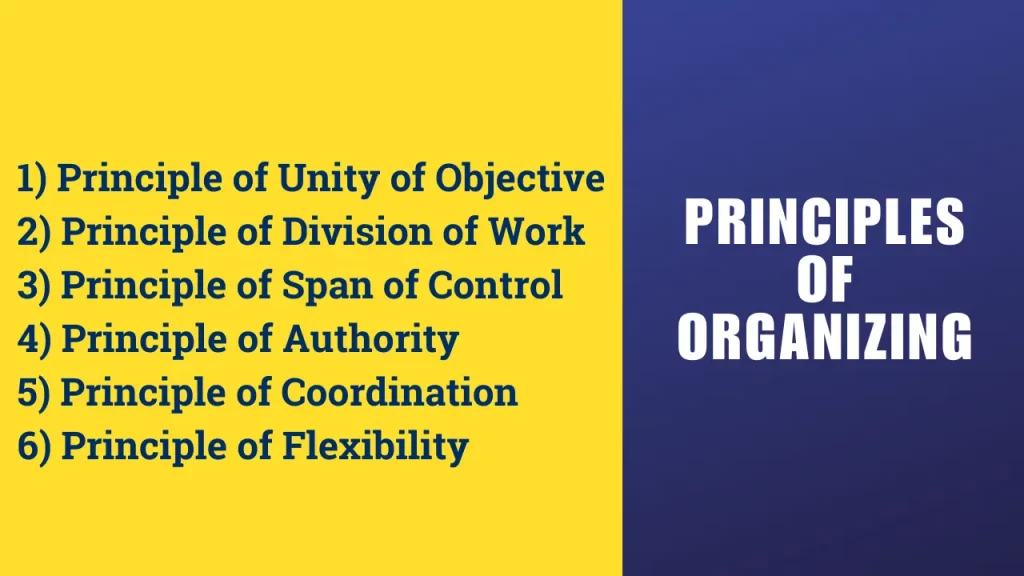6 Essential Principles of Organizing in Management – Scholarszilla
Table of Contents
Principles of Organizing
Introduction:
Successful management depends on efficient organization. We shall examine the essential organizing concepts and their real-world applications in this blog article.
Discover how these guidelines provide managers the power to organize teams, assign responsibilities, and create open lines of communication, resulting in more efficient processes and greater results.
The process of allocating resources, such as human capital, materials, and technology, in a systematic and coordinated way is referred to as organizing.
In order to facilitate effective collaboration and job completion, entails developing formal connections, outlining roles and responsibilities, and establishing communication channels.

The following are the Principles of Organizing:
1) Principle of Unity of Objective:
The unity of objective principle emphasizes the importance of coordinating team goals and personal ambitions with the overarching organizational goals.
Managers may prevent conflicts, promote collaboration, and improve synergy within the organization by making sure that everyone is aware of and working towards a common goal.
This idea supports efficient coordination and strong teamwork, encouraging employees to have a sense of purpose and direction.
2) Principle of Division of Work:
The principle of division of work, popularly known as division of labor, emphasizes the efficient allocation of tasks among individuals based on their skills and expertise.
Managers can increase productivity, specialization, and skill development by breaking complicated projects down into smaller, more manageable jobs. Employees can concentrate on their strengths according to this idea, which boosts productivity and overall effectiveness.
3) Principle of Span of Control:
The concept of span of control refers to how many employees a manager can effectively manage. Managers can maintain efficient communication, guarantee proper supervision, and encourage accountability by striking a balance between a controllable span of control and a hierarchical structure.
Micromanagement can emerge from an excessively tight range of control, whereas diminished control and oversight might happen from an excessively wide span of control. Finding the proper balance within the organization can improve decision-making and coordination.
4) Principle of Authority:
The hierarchical structure of an organization is established by the principle of authority, which also specifies the official channels of authority and responsibility.
It makes it clear who has the authority to give orders, give directives, and hold people responsible for their actions.
Clear reporting linkages are ensured, uncertainty is reduced, and an organization-wide feeling of order and accountability is fostered through the effective application of this principle.
5) Principle of Coordination:
The principle of coordination emphasizes the requirement for synchronization and integration of operations across various teams and departments within an organization.
Effective communication channels must be established, cross-functional collaboration must be established, and activities must be coordinated to achieve common goals.
Effective coordination increases productivity, reduces effort duplication, and fosters synergy across various organizational units.
6) Principle of Flexibility:
The flexibility principle is of utmost importance in the fast-paced corporate climate of today. It emphasizes how important it is for businesses to adjust to shifting market conditions, technology developments, and consumer preferences.
Managers must create adaptable systems that promote innovation, agility, and hasty decision-making. Organizations can maintain their competitive edge and take advantage of new opportunities by adhering to this idea.
Conclusion:
To structure their teams, assign responsibilities, and promote good communication and collaboration inside an organization, managers can use the organizing principles as a guide. Managers can foster efficiency, productivity, and adaptability by adhering to the concepts of unity of objective, division of tasks, span of control, authority, coordination, and flexibility.
These guidelines can help individuals reach their full potential and contribute to long-term success when they are properly applied and combined with a thorough understanding of the goals and dynamics of the organization.
Importance of Organizing
Importance of Staffing
Importance of Planning


